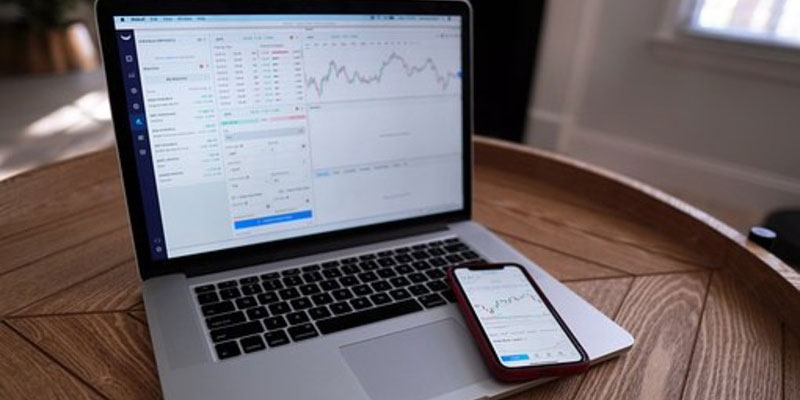Advertisement
Demystifying IPO Investments: How to Buy Your First IPO Stock
Oct 17, 2024 By John Davis
Are you considering an initial public offering (IPO) investment but don't know where to start? Don’t worry— you are not alone! For most people, the process of entering the stock market can seem intimidating and foreign. But don’t let that deter you from investing in one of the most lucrative opportunities available on Wall Street. This blog post will guide you on how to buy your first IPO stock, and provide guidance to demystify the unfamiliar language associated with this kind of investment vehicle. Whether you’re an experienced investor curious about IPOs or a fledgling explorer ready to take their first steps into the world of stocks, we hope this blog post will prove helpful for achieving success in your investments.
Understand the Basics of Initial Public Offerings (IPO):

Investing in a company's Initial Public Offering (IPO) can be a unique way of diversifying your portfolio, potentially providing significant returns over time. The basics of IPOs involve a company's first sale of stock to the public market. Before a company goes public, they are privately owned with a limited group of shareholders. Once they decide to go public, they offer shares to the public through a regulated process that involves a prospectus, underwriting, and SEC review.
As an investor, it's important to do your due diligence before investing in an IPO and consider various factors such as the company's financial health, industry trends, and growth potential. By understanding the basics of IPOs, you can potentially take advantage of investment opportunities and make informed choices for your financial future.
Research the Company Behind the IPO and Learn about its Financials:
Before investing in an IPO, it's important to research the company behind it and dive into its financials. This will give you a deeper understanding of how the company operates, its growth potential, and potential risks. By analyzing the company's financial statements, you can gain insight into its revenue, expenses, and overall financial health.
Make sure to also look at the company's industry trends and competitors to put its performance into context. This information will help you make an informed decision about whether or not to invest in the IPO. Remember, the more you know, the better equipped you'll be to make smart investment choices.
Decide how much Money you are Willing to Invest in an IPO Stock?
Investing in an IPO stock can be an exciting opportunity, but it's important to be mindful of how much money you're willing to put into it. It's easy to get caught up in the hype and think that investing all your savings is a great idea, but it's important to remember that there's always a level of risk involved.
Determine a reasonable amount that you're comfortable investing, taking into consideration your financial goals and current situation. By setting a budget, you can ensure that you're not putting yourself in a precarious financial position and can enjoy the potential benefits of investing without the added stress.
Open a Brokerage Account to Buy your First IPO Stock:

Investing in stocks can be an exciting way to diversify your portfolio and potentially earn profits. And what better way to begin your journey than by purchasing your first IPO? But before you can do so, you'll need to open a brokerage account. Fortunately, with the ease of online access, it's easier than ever to get started.
You'll want to do your research, comparing fees and commission rates, and even reaching out to customer service representatives to get a feel for the platform. And once you've found a brokerage account that fits your needs, the world of investing is at your fingertips. So go ahead, take that leap, and start your journey towards financial success.
Know when to Sell your IPO Stock – Research Market Conditions before Selling:
Investing in an initial public offering, or IPO, can be an exciting venture for any investor. After all, it's a chance to get in on the ground floor of a promising company. However, the decision to sell your IPO shares is just as critical as the decision to buy them. Before making any moves, take the time to research current market conditions. This will help you determine whether it's the right time to sell.
Waiting too long to sell can result in a decline in the value of your shares, whereas selling too soon could mean missing out on potential gains. By doing your due diligence, you'll be better equipped to make the right decision when it comes to selling your IPO stock.
Conclusion:
Investing in an IPO can be a great way to diversify your portfolio and potentially earn attractive returns. But before you jump into the world of stock investing, it's important to do your research and take the appropriate steps, from understanding the basics of Initial Public Offerings to deciding how much money you're willing to invest. With careful consideration and thoughtful action, you can make smart choices for your financial future and enjoy the potential benefits of investing. So go ahead, take that leap, and start building a successful portfolio!
FAQs:
What is an Initial Public Offering (IPO)?
An Initial Public Offering (IPO) is when a company first offers its stock to the public in a regulated process that involves a prospectus, underwriting, and SEC review.
How do I research the company behind an IPO?
When researching the company behind an IPO, it's important to analyze its financial statements, look at industry trends and competitors, and understand its growth potential. By understanding the basics of IPOs and doing your due diligence, you'll be better equipped to make informed decisions about investing in an IPO stock.
How do I open a brokerage account?
With the ease of online access, it's easier than ever to open a brokerage account. You'll want to compare fees and commission rates when selecting an account, as well as reach out to customer service representatives if needed. Once you've opened the account, you're ready to take your first steps into the world of stock investing!
Advertisement

When is the Right Time to Buy a House?

What You Need To Know Before Investing in Domain Names?

How much to save in your 20s, 30s, 40s and beyond

A Comprehensive Guide to Selling Stock in Your Company

Investing $100 a Month in Stocks for 30 Years

SIMPLE IRA Vs. Traditional IRA: What’s the Difference?

10 Steps to Becoming a Day Trader

Interest In Capitalization: What It Is, How It Operates, and a Sample

A Look at Primary and Secondary Markets

